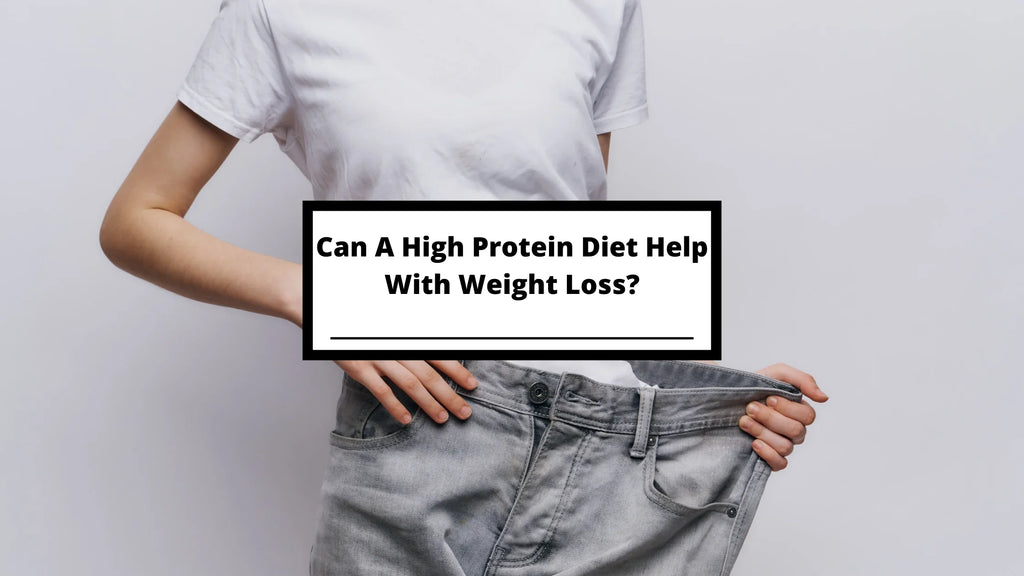Can A High Protein Diet Help With Weight Loss?

Introduction
So you've heard that a high protein diet can help with weight loss. Does that mean you should cut out carbs and fats entirely? Not necessarily! In this article, we'll explain why protein is so good for your body and how it can help you lose weight if combined with other healthy foods.
Protein can help you feel full longer.
Protein can help you feel full longer. One study found that protein is the most filling macronutrient, and it can also help suppress your appetite. This means that eating enough protein can help you lose weight by reducing your hunger level and stopping you from overeating later on in the day (or night).
It's also important to note that when we eat protein, it slows down digestion and helps us feel fuller for longer—and this is exactly what we want when we're trying to lose weight.
Protein can give you more energy for your daily activities.
Protein is a nutrient that can help you feel full longer. It's also important for keeping your bones, muscles, and skin healthy.
Protein is a nutrient that can help you recover from workouts and build muscle. Exercise helps burn calories so that you can lose weight if needed; however, protein can also be helpful with weight loss by helping keep your muscles strong while they're getting bigger through exercise.
If you want to lose weight by eating less food overall, protein can be an especially good way to do this because it makes people feel full longer than carbohydrates or fats would in their place (though all three of these are good sources of energy). This means that if someone eats enough protein instead of the same number of calories from carbohydrates or fat alone then they’ll end up eating fewer total calories each day without feeling hungry sooner than before when taking those other two options into account!
Drinking protein shakes can help you recover from workouts.
Protein shakes such as protein powders or protein waters can help you recover from workouts. After a workout, your muscles need to repair themselves and rebuild themselves stronger than before. Drinking a protein shake after a workout will help this process along by giving you nutrients that are easy for your body to absorb. This can also be beneficial if you're trying to build muscle or lose weight in general—having extra protein in your diet is always good, as it helps fuel both of those things!
While there's no hard-and-fast rule on when exactly you should drink your post-workout drink, most trainers recommend drinking within 30-60 minutes of finishing the gym session (that way the body doesn't have time for any protein synthesis). They also recommend adding some carbs like bananas or oatmeal into the mix so that there's an even balance between carbs and proteins when recovering from intense activities like lifting weights or running long distances
Protein is great for building muscle or weight loss.
Protein is the building blocks of muscle, but it does so much more than that. Protein is good for your immune system and brain, giving you a healthier body overall. When you try to lose weight, protein can help you feel full longer and keep from overeating as easily.
Protein might help with weight loss because it can reduce your appetite and increase feelings of fullness.
Protein might help with weight loss because it can reduce your appetite and increase feelings of fullness. The satiating effect of protein has been extensively studied in humans, with a multitude of studies demonstrating that higher-protein diets lead to greater weight loss than lower-protein diets.
Research also shows that increasing your protein intake can have beneficial effects on body composition and overall health by improving metabolic health (i.e., blood glucose, triglycerides, LDL cholesterol) over time.
You should still eat a balanced diet while on a high protein diet.
You should still eat a balanced diet while on a high protein diet.
Protein is only one of the nutrients you need to be healthy and feel full, so don't forget to include fruits, vegetables and other foods that provide vitamins and minerals in your diet as well. It's also important to remember that eating too much protein can cause health problems like kidney stones or osteoporosis by depleting calcium from bones. If you're not careful about balancing your high protein intake with other nutrients in your meals, it could lead to weight gain instead of loss!
Protein is good for you, but eating only foods high in protein isn't necessarily a good idea.
Protein is good for you, but eating only foods high in protein isn't necessarily a good idea. For example, you need to consume plenty of fruits and vegetables, which are high in fiber. You should also balance your diet with carbs (such as whole grains) and healthy fats (like olive oil). The following guidelines can help you maintain an ideal weight:
-
Eat a balanced diet that includes lean meat or dairy products, whole grains and beans.
-
Drink lots of water throughout the day. If you're thirsty, it's not always because your body needs more water; instead it may mean that your stomach is full or bloated from too much food -- so drink some more H2O before taking another bite! Protein Waters are an easy way to both hydrate and get your protein intake in.
-
Get regular exercise at least three times per week by walking briskly for 30 minutes every day after work on weekdays or weekends
A high protein diet is healthy and can help with weight loss, but you should still balance your diet by eating other foods as well
A high protein diet is healthy, but you should still balance your diet with other foods.
Firstly, a high protein diet isn't necessarily healthy. It can lead to weight gain if you don't exercise regularly and it can cause health problems if you don't eat enough fruits and vegetables. Also, drinking too much water can damage your kidneys because they have a limited capacity for absorbing water.
Conclusion
So, is the high protein diet for you? It can be, but it's not something you should try without consulting your doctor first! If you're looking to lose weight or build muscle mass, then this type of diet could be helpful. But keep in mind that there are certain foods that should still be included in your meals, such as fruits and vegetables.
